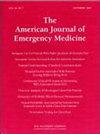Use of lipoglycopeptides for moderate to severe ABSSSI in the emergency department
IF 2.7
3区 医学
Q1 EMERGENCY MEDICINE
引用次数: 0
Abstract
The burden of acute bacterial skin and skin structure infections (ABSSSI) continue to plague the healthcare system. One approach to managing moderate-to-severe ABSSSI in low-risk patients involves use of a single dose lipoglycopeptide (LGP), dalbavancin or oritavancin, in the emergency department (ED) and discharge to home with follow-up care. Limited ED studies indicate decreased hospital stays, ED revisits, readmissions, and healthcare costs, as well as improved patient satisfaction with use of these antibiotics. However, existing literature has limitations and gaps, such as insufficient quantifiable data on patient selection criteria, outcome predictors, and risk factors leading to treatment failure. Moreover, there is lack of research on the impact of LGPs on organizational productivity, patient quality of life, and utility in indications beyond ABSSSI. This review focuses on the role of long-acting LGPs in the ED setting for select patients presenting with ABSSSI, aiming to avoid hospitalizations, expedite patient discharge, and prevent readmissions while acknowledging potential limitations of therapy. Additionally, it provides insights into strategies and considerations specifically relevant to implementing this therapeutic approach in the ED.
在急诊科使用脂聚糖肽治疗中重度 ABSSSI。
急性细菌性皮肤和皮肤结构感染(ABSSSI)继续困扰着医疗系统。处理低风险患者中重度 ABSSSI 的一种方法是在急诊科(ED)使用单剂量脂糖肽(LGP)、达巴万星或奥利他万星,然后出院回家并接受后续护理。有限的急诊科研究表明,使用这些抗生素可减少住院时间、急诊科复诊率、再入院率和医疗费用,并提高患者满意度。然而,现有文献存在局限性和不足之处,例如关于患者选择标准、结果预测因素和导致治疗失败的风险因素的量化数据不足。此外,关于长效抗生素对组织生产率、患者生活质量的影响以及在 ABSSSI 以外的适应症中的效用,也缺乏研究。本综述重点探讨了长效 LGPs 在急诊室环境中对特定 ABSSSI 患者的作用,旨在避免住院、加快患者出院和防止再次入院,同时也承认了治疗的潜在局限性。此外,本报告还深入探讨了在急诊室实施这种治疗方法的相关策略和注意事项。
本文章由计算机程序翻译,如有差异,请以英文原文为准。
求助全文
约1分钟内获得全文
求助全文
来源期刊
CiteScore
6.00
自引率
5.60%
发文量
730
审稿时长
42 days
期刊介绍:
A distinctive blend of practicality and scholarliness makes the American Journal of Emergency Medicine a key source for information on emergency medical care. Covering all activities concerned with emergency medicine, it is the journal to turn to for information to help increase the ability to understand, recognize and treat emergency conditions. Issues contain clinical articles, case reports, review articles, editorials, international notes, book reviews and more.

 求助内容:
求助内容: 应助结果提醒方式:
应助结果提醒方式:


